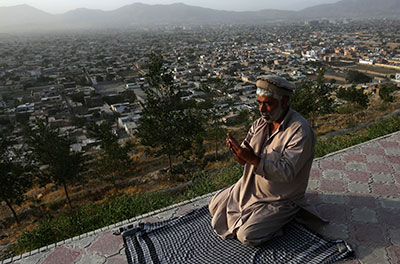I’m in Kabul for several days, making the rounds of journalists’ organizations and media houses. My brief is to see what, if anything, can be done to protect journalists after the withdrawal of NATO troops during and after 2014. But “post-2014” has much different connotations for the Afghans with whom I’ve spoken or been in email correspondence. They see post-2014 as the period that follows national elections. With foreign troops increasingly staying close to their bases, Afghans are fully aware their future is in their own hands.
On Wednesday, President Hamid Karzai signed one of a series of new election laws, this one configuring the membership of the election commission. Another will deal with complaints over voter fraud. The Afghans with whom I’ve been speaking are much more concerned about the details of those sorts of laws than they are about how many NATO troops, if any, will be here after the 2014 drawdown. “What we want are fair elections and a new media law. That is Afghanistan’s future,” one local journalist, who asked not to be identified, told me today.
No one is painting a pretty picture of the security situation, though Kabul seems quiet during Ramadan and violence overall has waned for the month. And they see political leaders–they don’t hesitate to call them “warlords”–maneuvering on several different levels. They are aware of groups in the north rearming; they readily identify which newspapers and television and radio stations belong to which groups; and bemoan the fact that a journalist who doesn’t toe the party line is liable to find themselves out of a job. The editorial strictures are so tight that, “Being a journalist in Afghanistan is like being in jail,” another reporter told me today. Nor do they underestimate the strength of the Taliban militarily or politically–they say there is a constant barrage of threats emanating from various Taliban groups, and from others.
I wrote earlier this year about the economics driving the shrinking Afghan media environment. With foreign funding drying up, a lot of outlets would soon disappear, I predicted. That hasn’t happened yet. There are still a few more or less independent media groups, but outlets backed by political figures have picked up the slack. Media, particularly broadcast, have grown slightly. In January I mentioned “warlord TV,” and in fact that has increasingly become the predominant form of media for Afghan consumers.
As I said, while I am here I’m supposed to do the groundwork for coming up with a plan to address what happens if things get a lot worse. Some have lost their jobs because of shrinking budgets. I’ve been told that more journalists are already leaving the field, particularly women, because of hostile political pressure. Some people just disappear for a while, some cross into an increasingly inhospitable Pakistan, others make it to India. Iran doesn’t appear to welcome fleeing Afghan journalists, though they might be softer on Shiites. Some try to get into overseas training programs. The European Union and Britain are the hardest to get into, and even the more liberal Scandinavian countries are tightening entry rules is the word on the Afghan street. The general sense is that escape routes are closing. “But if there is a political solution, it could be a chance for journalists to stay,” a third journalist told me today.
The feeling is that the best chance for journalists and for the country as a whole is for a viable political solution to somehow emerge out of the elections. They will have to be seen as free and fair (the voting that brought President Karzai to power is not seen to be that) and the winner will have to have the political skills and the strength of character to unite an impoverished nation in which, until now, narrow local loyalties determined who are the fittest to survive. If that doesn’t work, no one seems to put much hope in NATO troops staying on to make the situation right.
[Reporting from Kabul]
